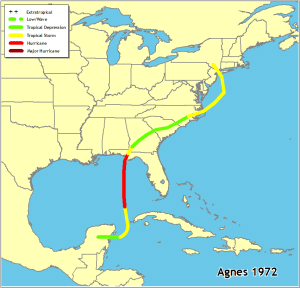
It’s considered the deadliest named tropical storm in Maryland’s history.
Reisterstown, Md. (KM) – One of the deadliest named storms in Maryland history paid a visit to the state 50 years ago this month. It was Hurricane Agnes which left 21 people dead and caused $110 million in damage in Maryland.
“Most of that damage was in central Maryland: Frederick County, Howard County, Baltimore County, Prince George’s County, Montgomery County, Carroll County, Baltimore City, those areas,” says Ed McDonough, spokesman for the Maryland Department of Emergency Management. He says a lot of it was due to flash flooding.
The National Weather Service says Hurricane Agnes was one of the most destructive hurricanes in US history, claiming 117 lives and causing $3.1 billion in damage in 12 states. The damage was particularly high in New York, Pennsylvania and Virginia as well as Maryland.

The Maryland Department of Emergency Management says Agnes makes the point that hurricanes can cause inland flooding as well as storm surge in coastal areas
McDonough says as a result of this destruction storm, Maryland has become more resilient in dealing with storms or other emergencies, and its residents have learned to prepare for future emergencies. “Our notifications and preparation of residents is better,” he says. “I think residents understand better how to be prepared, and listen to local news or the National Weather Service on updates about flash floods.”
But there are still a few problems. “We’re leaning about a lot about building, and what not. Unfortunately, we may not have earned enough. I think we’re learning now that there’s been in some cases too much building in some areas, and too many impervious services in some areas,” says McDonough.
He says residents always need to be prepared, and that includes having an emergency kit inside their homes, their cars and places of employment. That kit should include food, water, first aid kit, tools and supplies, sanitation, clothing and bedding, and special items for children, older adults and those with special needs and pets. McDonough also says residents should have a place to go if they must evacuate their homes.
By Kevin McManus